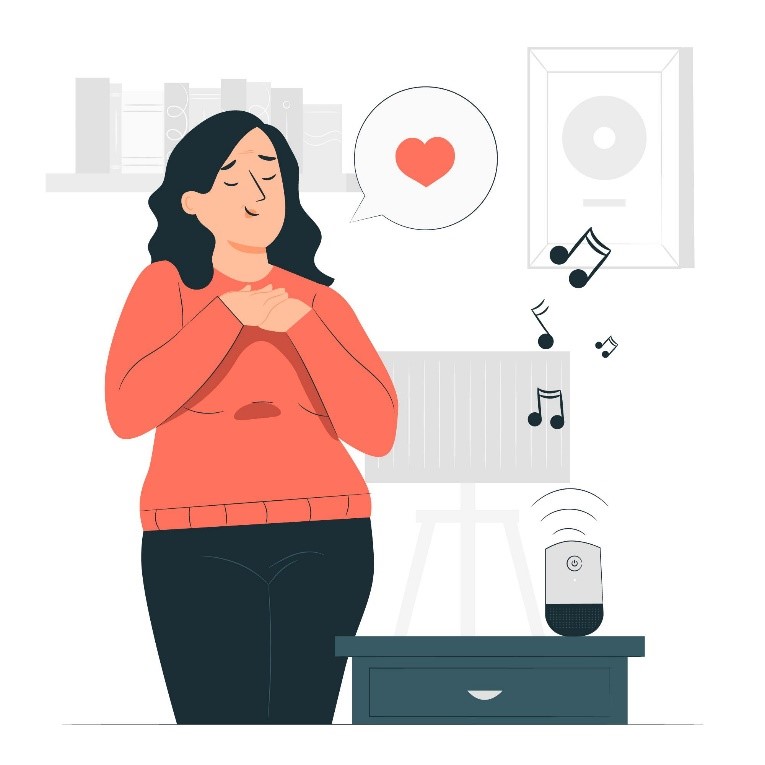Music has always been a remedy to negative emotions, which acts as an increasingly common ally in hospitals, as it contributes to reducing pain and favors the production of brain cells.
Listening to music is one of the most pleasant activities we can do. Music is capable of making us feel emotions, relive others, think, dream, have fun, relieve stress as well as create and connect with others. People who want to relax and comfort themselves would always think of music as one of the options. Listening to music has great effects on people’s emotions. It is also helpful for your mental health. But why does music affect our emotions this drastically? How can a few seconds of a soundtrack send a shiver down our spines, make our blood run cold, and help us completely forget we are being taken in by an illusion? The answer, according to researchers, is that it has a significant effect on our moods and emotions because of brain dopamine regulation (a chemical messenger strongly involved in emotional behavior and mood regulation).
There are a lot of benefits that we can get from music. Our mind also benefits from it in different ways. Here are the different effects of music on the mind
Music has relaxing elements that can make people feel better. Most days, people who listen to their favorite songs are happier. For people who are having a hard day, music can also be helpful in making them feel happier. This is why it works perfectly in improving mental health. The connection between music and mental health can be found in the matching benefits of the former to brain functions and emotions. Music has always been working for people who have mental health issues. Children who are experiencing anxiety, depression and lack of self-esteem can take music lessons. It provides confidence, relaxation and even helps in emotional healing. Adults who have traumatic experiences also benefit from music. It helps relieve people from the negative feelings brought by stress and pressure. Therefore, psychiatrists suggest music therapies to their patients.
It has been proven many times that listening to music can help improve memory. This is evident in scenarios where students review with background music. While reading or doing something, music can actually boost your brain function. It is also good for babies who are still in the womb of their mothers. It has been proven that mothers who listen to classical music can help improve the brain function of their babies. In cases where a person is experiencing mental health-related conditions, music can be used as part of the therapy. For those who are experiencing depression and other conditions, good music can be a perfect distraction. The perfect song or music can provide comfort and can change the mood. It eases the brain and gives people peace. It may not be used as a major treatment but it can work wonders in the mind of the patient. There are days when it seems so hard to even get up from bed. There are also days when you feel like you cannot start your work. In times like this, you can listen to music. You will notice how your mood can change when you play an upbeat song or your favorite music. This is an effect that music can easily bring. Listening to motivational songs can also help you get through the day.
Stress is a normal part of a busy day. If you are an adult and you are working, you might not be able to get away from stress. But if you are going to integrate music into your daily activities, you will be able to get away from it all. This is also the same with anxiety. Whenever you feel anxious, listening to music can help create a good distraction. Learning is better when you are going to listen to music. Some children and even adults easily feel sleepy when they are reading. This is something that you can work on if you are going to listen to music. It will enhance the memory and it can help you understand the things that you are reading. Music therapy is an option for people who are experiencing chronic pain due to disease. There are specific types of music that are soothing. It does not really work in the healing but it helps in the reduction of pain.
Which Type of Music is good for Mental Health?
The answer to this question is relative. Firstly, this depends on the preference of the person. If you listen to your favorite song, you will surely feel much better. Motivational music, classical and other relaxing types of music are perfect for your mental health. If you want to relax and relieve stress, you should choose to listen to soothing music and avoid loud sounds. But the youth of today often show a strong desire to rap and rock music which I consider as “red music”. In my opinion, red music creates conflicts in your mind resulting in unexpressive people, however, it varies from person to person.
All in all, music is indeed a perfect tool that can be used to deal with depression and other mental health issues. Along with relaxing and resting, you can consider listening to music. You can also listen to it while you are busy doing other stuff. If you want to work on your confidence, you can learn to play an instrument. On the other hand, it builds up your creativity and skills. Sometimes it will create the path to your career too. There are many different ways you can enjoy music, and it is easily accessible to almost everyone. So, if there are people who show a lack of interest in music, I would recommend to try out without any hesitation and feel the change in your life.
Written by: Rtr. Michelle Perera
Edited by: Rtr. Lakshan Banneheke





